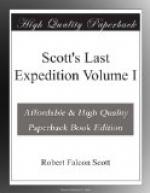But beyond this it may be argued that we have an unnecessary amount of food: 32 oz. per day per man is our allowance. I well remember the great strait of hunger to which we were reduced in 1903 after four or five weeks on 26 oz., and am perfectly confident that we were steadily losing stamina at that time. Let it be supposed that 4 oz. per day per man might conceivably be saved. We have then a 3 lbs. a day saved in the camp, or 63 lbs. in the three weeks, or 1/100th part of our present loads.
The smallness of the fractions on which the comfort and physical well-being of the men depend is due to the fact of travelling with animals whose needs are proportionately so much greater than those of the men. It follows that it must be sound policy to keep the men of a sledge party keyed up to a high pitch of well-fed physical condition as long as they have animals to drag their loads. The time for short rations, long marches and carefullest scrutiny of detail comes when the men are dependent on their own traction efforts.
6 P.M.—It has been blowing from the S.W., but the wind is dying away—the sky is overcast—I write after 9 hours’ sleep, the others still peacefully slumbering. Work with animals means long intervals of rest which are not altogether easily occupied. With our present routine the dogs remain behind for an hour or more, trying to hit off their arrival in the new camp soon after the ponies have been picketed. The teams are pulling very well, Meares’ especially. The animals are getting a little fierce. Two white dogs in Meares’ team have been trained to attack strangers—they were quiet enough on board ship, but now bark fiercely if anyone but their driver approaches the team. They suddenly barked at me as I was pointing out the stopping place to Meares, and Osman, my erstwhile friend, swept round and nipped my leg lightly. I had no stick and there is no doubt that if Meares had not been on the sledge the whole team, following the lead of the white dogs, would have been at me in a moment.
Hunger and fear are the only realities in dog life: an empty stomach makes a fierce dog. There is something almost alarming in the sudden fierce display of natural instinct in a tame creature. Instinct becomes a blind, unreasoning, relentless passion. For instance the dogs are as a rule all very good friends in harness: they pull side by side rubbing shoulders, they walk over each other as they settle to rest, relations seem quite peaceful and quiet. But the moment food is in their thoughts, however, their passions awaken; each dog is suspicious of his neighbour, and the smallest circumstance produces a fight. With like suddenness their rage flares out instantaneously if they get mixed up on the march—a quiet, peaceable team which has been lazily stretching itself with wagging tails one moment will become a set of raging, tearing, fighting devils the next. It is such stern facts that resign one to the sacrifice of animal life in the effort to advance such human projects as this.




